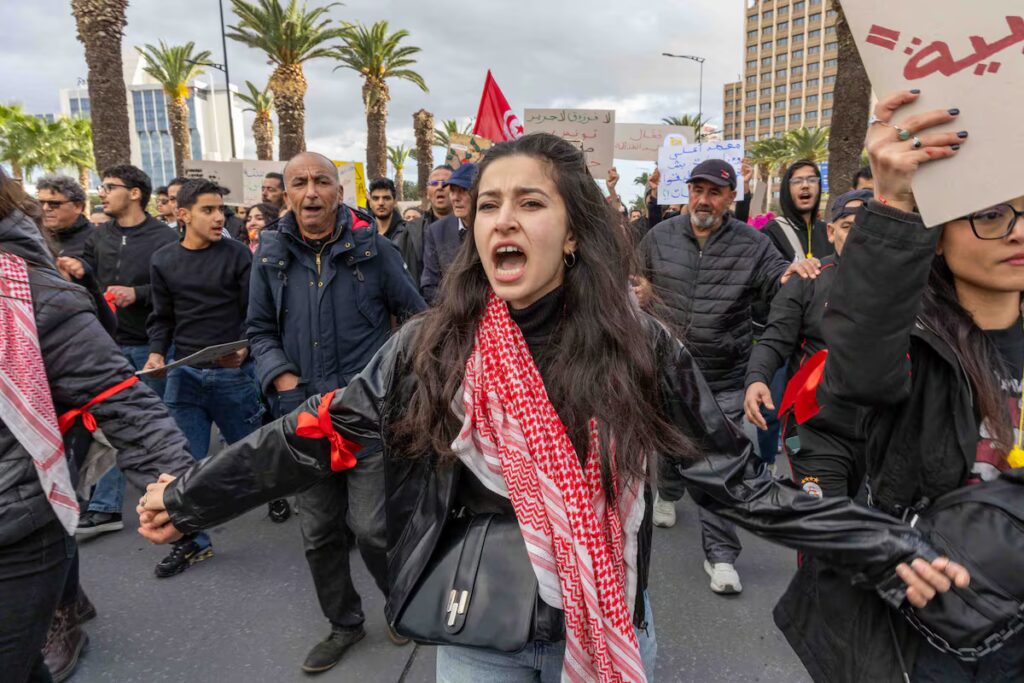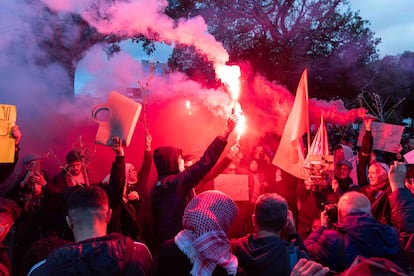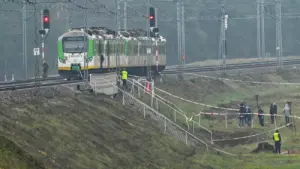
The succession of environmental and social protests that has shaken Tunisia for a month calls into question the autocratic power of President Kais Said, in office since 2019 and re-elected last year after closing Parliament in 2021. The deterioration of public services and the economic crisis affecting the Maghreb country, where the minimum wage is 450 dinars (around 130 euros), are at the origin of the largest wave of unrest. registered citizen since Said came to power, who spearheaded the demolition of the multi-party system that emerged in 2011 at the first outbreak of the Arab Spring.
After the strike in the transport sector and the more recent one by bank employees, last week mobilizations of doctors and journalists took to the streets of the Tunisian capital. Thousands of people demonstrated in Tunisia on Saturday to attack Said’s policies. The president systematically attributes expressions of discontent to a foreign conspiracy aimed at weakening the state through fictitious crises.
The massive protests against pollution in the coastal region of Gabes (southeast) were the ones that most intensely shook the foundations of the regime. Last month, tens of thousands of people took to the streets in a general strike against poisonings caused by the chemical industry.
In September, more than 200 people, mostly school children, had to be treated at area health centers with respiratory problems. Up to 120 have been hospitalized with symptoms of asphyxia due to toxic gas emissions from the complex of public company Groupe Chimique Tunisiene (GCT).
The demonstrators of Gabes (400,000 inhabitants) called for the paralysis of the plant’s activities. Inaugurated more than 50 years ago for the production of fertilizers – through the processing of phosphates extracted from the mines of Gafsa, near the border with Algeria – the pollution generated by the CGT complex (which directly employs around 4 thousand people) has ruined an agricultural and fishing region which today records an unemployment rate close to 25%.
President Said was quick to describe the industrial policy of the last half century as “environmental murder” and sent a government commission to hear the complaints of the citizens of Gabes, who had already been promised the disappearance of polluting industries by 2017. Several civil society organizations responded with a complaint to the court demanding the closure of the CGT plant after hearing the official explanations.
Fertilizers contribute around 5% of Tunisia’s gross domestic product (GDP) and account for 10% of its exports. The government had already announced in March its intention to increase fertilizer production fivefold by 2030. Instead of studying the dismantling of the Gabes plants, the executive chaired by Said proposes to reactivate six chemical projects in the same area – in principle with a technology that limits the emission of toxic gases into the atmosphere – for a sum close to 60 million euros at the exchange rate.
There is no immediate solution to the conflict in sight. For the third time in a month, the Gabes court postponed on Thursday the judicial proceedings, defined as urgent, on the paralysis of the activity of the chemical plant requested by citizens’ associations. The new hearing has been set for December 4, according to the Efe agency.
“The official narrative dismantled”
A political analyst, who prefers to remain anonymous to avoid a new criminal case against him, underlines in an exchange of messages with EL PAÍS that “the regime tries to find solutions to the pollution case, but cannot because it is a structural problem that has existed for more than 50 years”.
“But it cannot even accommodate the citizens’ request to close the chemical plant,” he warns, “as this would deprive the stadium of essential revenue.” According to the same source, Gabes’ protests “have dismantled the official narrative of a regime that claims to respond above all to the needs of the people.” “For now, only a study commission has been created while the theory of a foreign conspiracy against the country continues to be brandished, without offering a serious answer to the problem,” he underlines.
Hundreds of journalists gathered in Tunisia’s capital on Thursday to demand respect for freedom of expression following the prosecution and imprisonment of several journalists, Efe reports. Protesters have rejected the delay in the delivery of accreditations that allow local and foreign whistleblowers to practice the profession. They are subject to supervision by the Ministry of Communications, where, according to the National Union of Tunisian Journalists, they remain stuck in “administrative irrationalities.” In the last presidential elections, EL PAÍS achieved only silence on its request for press credentials.
In another protest front, thousands of doctors went on strike on Wednesday to demand a salary increase and denounce the deterioration of the health system, obsolete medical equipment and lack of medicines, the Reuters agency reports. Younger doctors say this is causing an exodus of professionals to hospitals in Europe and the Middle East.
The opposition cornered
The government has almost no one left to question it. In April, an anti-terrorism court imposed the largest sentence handed down in Tunisia against the opposition since the end of President Zin el Abidín Ben Ali’s dictatorship in 2011. Four dozen party leaders, former top officials, intellectuals and businessmen were sentenced to terms ranging from 13 to 66 years in prison, accused of “conspiracy against state security.” These are figures belonging to different political currents – conservative and progressive, secular and Islamist – although with the common denominator of having opposed the authoritarian drift of President Said.
A month earlier, the historic Islamist leader Rachid Ganuchi, 83 years old, founder of the Ennahda party, the party with the most votes (40.7%) in the 2019 legislative elections, the last in which he was able to run before the ban, had already been put on trial. Ganuchi was sentenced to 22 years in prison, in addition to the 10 years in prison he accumulated in two previous trials and for which he has been behind bars since 2023.
“The country is a pressure cooker”
Many of the defendants were later jailed two years after their arrest. Others were tried in absentia after fleeing the country. Among the first was the social democrat Jayam Turki Zaragoza, sentenced to 48 years in prison, who has a Spanish passport as the son of a republican in exile after the Spanish civil war. A source close to his legal defense said on Friday that the appeal hearing against his sentence, scheduled for Thursday, had been postponed by a week “due to the growing climate of social protest”. “The country is now a pressure cooker,” says a source in Turki’s legal defense circle.
In another message, the aforementioned political analyst, who speaks on condition of anonymity for fear of suffering retaliation, however believes that in Tunisia “there continues to be popular support for the regime and Said continues to have the trust of sectors of the population after the stigmatization of the traditional political class”. “This works in their favor,” he says, “since there is no real alternative to power at the moment.”
In Saturday’s massive protest, one of the largest in Tunisia under Said, demonstrators held banners reading “Not my president” and expressed solidarity with people affected by pollution in Gabes. They also called for the freedom of “prisoners of conscience.”

Said was elected six years ago with the hope of ending the political and economic misrule prevailing amid the Maghreb country’s stunning transition. But in 2021 he dissolved Parliament, in what was denounced as a “self-coup” denounced by the majority of parties, and a year later he reformed the Constitution to concentrate the key powers of the state in his hands.
“Finally, the protests are damaging his image, built by Said’s official propaganda, of a president who responds above all to the will of the people,” concludes the Tunisian political scientist. As evidence of citizens’ growing indifference towards his figure, the latest parliamentary elections in Tunisia, held in 2023, left polling stations empty, with an abstention of almost 90%.
A year ago, voters turned their backs on Said’s re-election and 72% of registered voters showed their disinterest in a vote in which the main opposition candidates were in prison or had their candidacy vetoed. In 2014, the first democratic elections after the founding uprisings of the Arab Spring that overthrew the dictator Zin el Abidín Ben Ali, recorded an abstention of 37%.
To consolidate his power, Said has embarked on a tough policy towards the thousands of irregular sub-Saharan migrants trying to reach European shores from Tunisia. In exchange he negotiated an agreement with the European Union, fundamental to stop the arrival of small boats in the central Mediterranean, for which he aspires to receive up to 1 billion euros in aid for the development of the Maghreb country.





